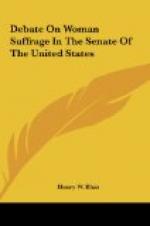As already observed, the exclusion of woman from the suffrage under our form of government can be justified upon proof, and only upon proof, that by reason of her sex she is incompetent to exercise that power. This is a question of fact.
The common ground upon which all agree may be stated thus: All males having certain qualifications are in reason and in law entitled to vote. Those qualifications affect either the body or the mind or both.
First, the attainment of a certain age. The age in itself is not material, but maturity of mental and moral development is material, soundness of body in itself not being essential, and want of it alone never working forfeiture of the right, although it may prevent its exercise.
Age as a qualification for suffrage is by no means to be confounded with age as a qualification for service in war. Society has well established the distinction, and that one has no relation whatever to the other; the one having reference to physical prowess, while the other relates only to the mental and moral state. This is shown by the ages fixed by law for these qualifications, that of eighteen years being fixed as the commencement of the term of presumed fitness for military service, and forty-five years as the period of its termination; while the age of presumed fitness for the suffrage, which requires no physical superiority certainly, is set at twenty-one years, when still greater strength of body has been attained than at the period when liability to the dangers and hardships of war commences; and there are at least three millions more male voters in our country than of the population liable by law to the performance of military duty. It is still further to be observed, that the right of suffrage continues as long as the mind lasts, while ordinary liability to military service ceases at a period when the physical powers, though still strong, are beginning to wane. The truth is, that there is no legal or natural connection between the right or liability to fight and the right to vote.
The right to fight may be exercised voluntarily or the liability to fight may be enforced by the community whenever there is an invasion of right, and the extent to which the physical forces of society may be called upon in self-defense or in justifiable revolution is measured not by age or sex, but by necessity, and may go so far as to call into the field old men and women and the last vestige of physical force. It can not be claimed that woman has no right to vote because she is not liable to fight, for she is so liable, and the freest government on the face of the earth has the reserved power under the call of necessity to place her in the forefront of battle itself, and more than this, woman has the right, and often has exercised it, to go there.
If any one could question the existence of this reserved power of society to call the force of woman to the common defense, either in the hospital or the field, it would be woman, who has been deprived of participation in the government and in shaping the public policy which has resulted in dire emergency to the state. But in all times, and under all forms of government and of social existence, woman has given her body and her soul to the common defense.




